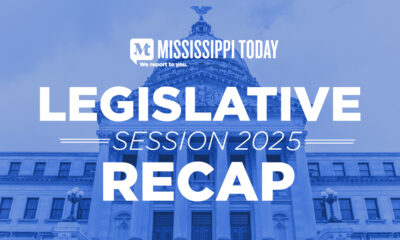Mississippi News
Doctors, advocates worry rape victims won’t have abortion access
Can rape victims access abortion in Mississippi? Doctors, advocates say no.
Mississippi law theoretically allows rape victims access to abortion, an exemption state leaders tout. But the doctors and advocates who work with victims say in reality, that access is almost nonexistent.
Since the U.S. Supreme Court overruled Roe v. Wade, allowing Mississippi’s 2007 trigger ban to take effect in July, abortion has been legal in the state in only two cases: when necessary to save the life of the mother and when a pregnancy resulted from a rape that has been reported to law enforcement.
“It does in fact have an exception for rape and it has an exception for life of the mother,” Gov. Tate Reeves said in a television appearance earlier this year. “I think that there’s no doubt that there are instances, there are individuals that certainly push for exceptions, and that’s okay.”
But doctors told Mississippi Today that they’re not aware of anyone in the state who will provide the procedure for rape victims because of concerns about potential legal consequences and logistical hurdles.
Mississippi Today surveyed more than 20 hospitals and hospital chains in the state about whether they would provide legal abortions to people who have reported a rape to law enforcement. Some of the state’s biggest hospitals – including the University of Mississippi Medical Center and North Mississippi Health Services – refused to comment at all.
Of those that responded, none said that its doctors would provide abortions for people who had reported a rape to law enforcement.
“I don’t think people in Mississippi can have comfort around, ‘Oh, if I’m raped, I will have access,’” one Jackson-area OB/GYN told Mississippi Today, speaking on the condition of anonymity because the physician did not have permission from their employer to talk to the media. “You probably won’t. You’ll have to find someone to do it that includes a hospital with the whole team there supporting that, and that’s much more difficult.”
A medical professional could face up to 10 years in prison if convicted of providing an illegal abortion. Because for years all of the state’s elective abortions – which includes all procedures that are not medically necessary – took place at Mississippi’s sole abortion clinic, many OB/GYNs around the state lack the training to perform the procedure.
That means victims of sexual violence will likely be forced to travel hours away from home to end a pregnancy that resulted from rape.
Reeves’ office did not respond to a request for comment for the story.
Before Mississippi’s trigger ban took effect, the state’s sole abortion clinic, the Jackson Women’s Health Organization, provided abortions for rape victims. The clinic is now closed.
Diane Derzis, the clinic’s owner, said most of the time clinic staff did not know when they were serving a patient who had been raped. But a few times a year, law enforcement came to the clinic to pick up fetal remains, which could be used to gather DNA evidence to identify an assailant.
Derzis said she doesn’t believe anyone in Mississippi will provide abortions for people who have reported a rape.
“They’re screwed,” she said of rape victims. “Plain and simple. No one is going to take the responsibility or the liability … People are scared to death, not just there but all over the country about what they can and can’t do. And they’re just not going to be willing to put themselves or their licenses on the line.”
Even before Dobbs, Mississippi doctors were wary of providing abortions. The Pink House exclusively employed out-of-state OB/GYNs who flew in monthly for a few days at a time.
Anti-abortion activists protested at the homes of Mississippi-based abortion providers.
“We go to the neighborhoods and tell everybody in the neighborhood what they do,” long-time anti-abortion activist David Lane told Mississippi Today in June. “They don’t like that. But if it’ll get rid of them, and it’s legal, we’ll do it.”
It’s unlikely that any Mississippi doctors who do provide legal abortions will talk publicly about it – both for fear of legal action and to avoid attracting anti-abortion activists.
Rob McDuff, an attorney at the Mississippi Center for Justice, which represented the clinic before it closed this summer, said he does not expect to see prosecutions of medical providers for performing abortions under the law’s exceptions.
“I fully expect that state officials will allow health care professionals to use their best judgment in the difficult situations they will encounter, and I don’t think those doctors and nurses will be prosecuted,” he said. “If any are, we stand ready to defend them without charge, just as we will defend any others who are arrested for abortion-related crimes.”
Mississippi is one of a handful of states that bans abortion but has an exception for rape. There is no exception for incest.
Michele Goodwin, a law professor at the University of California, Irvine and an expert in reproductive rights, said that exceptions for rape and incest can serve a political purpose without actually ensuring victims have access to abortion.
“Lawmakers get to satisfy part of their base that is skeptical about their anti-abortion lawmaking, or they get to say, ‘We put into the law these exceptions,’ hoping that people won’t pay close attention,” Goodwin said. “But if you unpack what that looks like, those burdens are inordinate.”
Now that the Pink House is closed, Mississippians’ nearest options for a legal abortion are in Florida, where it is permitted up to 15 weeks of pregnancy, or southern Illinois, where the town of Carbondale has become an access point for people living in ban states across the South and Midwest.
When lawmakers added an exception for rape to Mississippi’s pre-Roe abortion ban in 1966, they considered requiring a local judge to first certify that a rape had taken place. But they rejected that idea on the grounds that it embarrasses victims.
The exception now requires victims to file “a formal charge of rape … with an appropriate law enforcement official.”
Forensic nurses told Mississippi Today that they’re also concerned about leaving their patients’ ability to access a medical procedure in the hands of law enforcement.
Nationally, only about a third of sexual assaults are reported to police. And only about a sixth of those reports result in arrests.
In the vast majority of rape cases, the victim knew the assailant, so filing a police report could have life-altering consequences.
Fear of retaliation, the belief that police won’t help them, and considering the assault a personal matter are among the reasons people choose not to report, according to Department of Justice statistics.
Chance Lovern, a nurse at the Ochsner Rush emergency room in Meridian, said his experience aligns with the national data: Most of the patients he has worked with knew their attacker.
The sexual assault exams he performs are careful and detail oriented. Patients stand on a sheet to change so any physical evidence can be collected. Nurses document physical injuries like bruises and fractures, and perform vaginal and anal swabs for DNA. At every stage, a patient can ask to stop or skip part of the exam.
He asks victims if they have contacted the police, but he never urges them to do so.
“It’s a traumatizing event already,” he said. “It’s going to be their decision in the long run if they want to.”
Alizbeth Eaves, one of the state’s few certified sexual assault nurse examiners (SANE) and the trauma and SANE program manager at Ochsner Rush in Meridian, said the language of the rape exception is also unclear. What constitutes “a formal charge?” Is it simply filing a police report, or does someone have to be charged with the crime?
She recently saw a 16-year-old who had been raped by her uncle starting when she was 14 years old. The teenager’s father caught his brother in the act and called the police. But when they arrived, they initially refused to arrest the uncle.
“The investigator says, ‘She’s 16, it’s consensual, there’s nothing we can do,’” Eaves said.
Eventually, the uncle was arrested on two counts of statutory rape, stemming from previous incidents. But it was easy to imagine the case taking a different turn.
“If she had gotten pregnant from that sexual assault that day, and law enforcement refused to press charges because, quote, ‘She was 16 and [it was] consensual,’ she would have been forced to carry that pregnancy, because a formal rape charge would not have been filed because law enforcement wasn’t going to do that,” Eaves said.
A Mississippi forensic nurse who spoke on the condition of anonymity also said she routinely sees police demonstrate skepticism and even hostility toward victims. She has heard officers ask victims whether they actually wanted to have sex with their assailants and suggest that they should not have been alone with them.
After the Supreme Court overturned Roe v. Wade and Mississippi’s trigger ban took effect, Stephanie Piper, sexual assault program manager at the nonprofit Gulf Coast Center for Nonviolence, helped a woman who had become pregnant after unwanted sex get an appointment for an abortion in Florida. Instead of a six-hour round trip drive to Jackson, she had a 10-hour round trip to Tallahassee.

In that case, the woman knew the man who impregnated her and had previously had consensual sex with him. She had no interest in filing a police report.
“She was scared if she didn’t have sex with him something worse was going to happen,” Piper said. “In my eyes that’s a sexual assault. If she came forward to law enforcement and said everything I just said, they’re probably not going to go forward with the case.”
Lovern, a native of Philadelphia, Miss., grew up in the Pentecostal church, surrounded by opposition to abortion. His work as a nurse has changed his perspective, introducing him to situations where abortion was medically necessary. And he can see how carrying a pregnancy to term could change a sexual assault victim’s life forever.
“I’m not saying that they wouldn’t love their child any differently, but it’s always going to bring back a physical presence of that assault,” he said.
This article first appeared on Mississippi Today and is republished here under a Creative Commons license.
Mississippi News
Ole Miss women get pair of double-doubles and roll to 83-65 March Madness win over Ball State
SUMMARY: Mississippi coach Yolett McPhee-McCuin found solace in returning to a different arena in Waco, Texas, following a disappointing previous tournament experience. The No. 5 seed Ole Miss Rebels redeemed themselves with an 83-65 victory over 12th-seeded Ball State in the NCAA Tournament’s first round. Starr Jacobs led the Rebels with 18 points and 11 rebounds, while Kennedy Todd-Williams and Madison Scott each scored 15 points. Ole Miss dominated rebounding, leading 52-32, and will face fourth-seeded Baylor next. Coach McPhee-McCuin noted the team’s evolution since their last visit and the significance of playing in Texas, where Jacobs feels at home.
The post Ole Miss women get pair of double-doubles and roll to 83-65 March Madness win over Ball State appeared first on www.wjtv.com
Mississippi News
Events happening this weekend in Mississippi: March 21-23
SUMMARY: This weekend (March 21-23), Mississippi offers a range of exciting events. Highlights include Hal’s Marching MALfunction Second Line Stomp and Jessie Robinson’s blues performance in Jackson, as well as the Natchez Food & Wine Festival and the Natchez Little Theatre’s production of *This Side of Crazy*. There are also numerous exhibitions like *Of Salt and Spirit: Black Quilters in the American South* in Jackson and *Gold in the Hills* in Vicksburg. Other events include the 48th Annual Crawfish Classic Tennis Tournament in Hattiesburg, karaoke nights in Laurel, and a variety of family-friendly activities across the state.
The post Events happening this weekend in Mississippi: March 21-23 appeared first on www.wjtv.com
Mississippi News
Events happening this weekend in Mississippi: March 14-16
SUMMARY: This weekend (March 14-16) in Mississippi offers a variety of events. In Jackson, iconic saxophonist Boney James performs at the convention center, while the JXN Food & Wine festival showcases culinary talents. The LeFleur Museum District hosts a “Week of Wonder,” and several exhibitions, including “Of Salt and Spirit,” celebrate Black quilters. Natchez features the Spring Pilgrimage tours, a reenactment of Annie Stewart’s story, and a St. Patrick’s Day celebration. In Hattiesburg, comedian Rob Schneider performs, and various events like a St. Patrick’s Day pub crawl and a talent show will take place throughout the area.
The post Events happening this weekend in Mississippi: March 14-16 appeared first on www.wjtv.com
-

 News from the South - Florida News Feed5 days ago
News from the South - Florida News Feed5 days agoFamily mourns death of 10-year-old Xavier Williams
-

 News from the South - Arkansas News Feed7 days ago
News from the South - Arkansas News Feed7 days agoReport: Proposed Medicaid, SNAP cuts would cost Arkansas thousands of jobs, $1B in GDP
-

 News from the South - Alabama News Feed6 days ago
News from the South - Alabama News Feed6 days ago1 Dead, Officer and Bystander Hurt in Shootout | March 25, 2025 | News 19 at 9 p.m.
-

 News from the South - North Carolina News Feed7 days ago
News from the South - North Carolina News Feed7 days agoClassmates remember college student hit by car, killed near NC State
-

 News from the South - Alabama News Feed4 days ago
News from the South - Alabama News Feed4 days agoSevere storms will impact Alabama this weekend. Damaging winds, hail, and a tornado threat are al…
-

 News from the South - Alabama News Feed3 days ago
News from the South - Alabama News Feed3 days agoUniversity of Alabama student detained by ICE moved to Louisiana
-

 News from the South - Oklahoma News Feed7 days ago
News from the South - Oklahoma News Feed7 days agoRep. Tom Cole Says DOGE Is ‘Pretty Responsive’ to His Concerns
-

 News from the South - Louisiana News Feed5 days ago
News from the South - Louisiana News Feed5 days agoSeafood testers find Shreveport restaurants deceiving customers with foreign shrimp














































